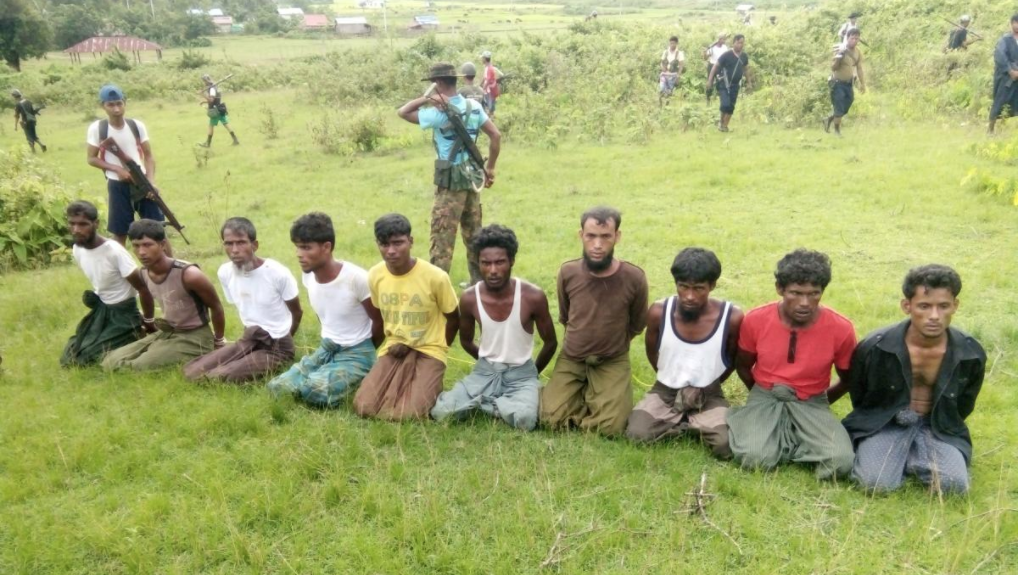The seven soldiers sentenced to 10 years hard labor for their involvement in the Inn Dinn massacre served less than a tenth of their sentence before quietly being freed in November, Reuters reported this morning.
The early release, exclusively confirmed to the wire service by two prison officials, two former fellow inmates and one of the involved soldiers, came after their sentence was “reduced by the military.”
While inside Sittwe Prison, the seven — convicted of murdering 10 unarmed Rohingya men in September 2018 — received special treatment in the form of beer and cigarettes, fellow inmates told Reuters.
One of the soldiers added that he and fellow soldiers had been “told to shut up” after their early release.
Matthew Smith, co-founder and chief executive at Fortify Rights, told Coconuts Yangon that the news was “unconscionable but not surprising.”
“The military takes care of its own people in all the wrong ways— releasing these soldiers sends the wrong message entirely about how soldiers should conduct themselves, and it comes as soldiers continue to commit atrocities. The UN Security Council should implement a global arms embargo against the military and refer the situation in Myanmar to the International Criminal Court,” he said.
While social media quickly erupted at the news, blaming both the military and Aung San Suu Kyi’s civilian government, Ro Nay San Lwin of the Free Rohingya Coalition told Coconuts Yangon today that the international community is equally to blame for “not taking serious action against both the government and military of Myanmar.”
“It is happening because of impunity. The UN fact-finding mission has said the genocide is still ongoing but yet the world is failing to take action,” he said.
In retrospect, Ro Nay said he believed there were signs that the seven soldiers had been pardoned and released as early as April 2018.
“Last year in April, MNTV news made an announcement that these seven soldiers were pardoned, but the video clip was taken down and Daw Suu Kyi’s spokesman Zaw Htay flatly denied it,” he said.
On Zaw Htay’s social media platforms, the spokesperson did in fact denounce a news broadcast by state-owned Myanmar National TV, calling it “wrong news.”
ေထာင္ဒဏ္ (၁၀)ႏွစ္စီ မၾကာေသးခင္က က်ခံခဲ့ရတဲ့ စစ္ေတြေထာင္က တပ္မေတာ္သား အရာရွိ/စစ္သည္ (၇)ဦး ႏိုင္ငံေတာ္သမၼတ ရဲ႕ ျပစ္ဒဏ္လြတ္ျငိမ္းခြင့္မွာ ပါဝင္တယ္ ဆိုတဲ့ MNTV News သတင္း မဟုတ္ပါ။ "မွားပါတယ္"
— Zaw Htay (@ZawHtayMyanmar) April 18, 2018
https://www.facebook.com/official.zawhtay/posts/1657884514308630?__xts__[0]=68.ARDWJyErRPcDwLAgMzfv9GeqonbhsFtQS0qbUhzVlfI3lQJdU-r3g7CKdNa7mugt-LhabZmh-VbV3FFoEfAs8noVCGos9m3rX4iZV5UZRNbQN2ApM7RPeO5H-SiYsvGJreOM5UXP0iy7x6daazqI1fwpXRN9cuqFwinLIAZ06D2D1zjpLAMr6LJaGE3pR6_yCHjXcNujHGKmK1fm&__tn__=-R
In the broadcast in question, a female newsreader told viewers that the seven soldiers who were “part of the Inn Dinn affair,” had been released from Sittwe as part of a broader pardon.
Myanmar authority released seven army officers who committed #Rohingya massacres in InnDinn of Maungdaw. State's TV channel pic.twitter.com/FeWCNP03OW
— Aung Aung (@Aungaungsittwe) April 18, 2018
But even with a November release, the soldiers would have spent far less time behind bars than did the two Reuters reporters who exposed the massacre in the first place. Wa Lone and Kyaw Soe Oo served 511 days in Insein Prison on what many believe were trumped up charges to punish them for their Pulitzer Prize-winning coverage of the military’s crimes in Rakhine.
Mark Farmaner, director of Burma Campaign UK, also had strong words for the international community, saying that the only reason the soldiers went on trial was because of “negative publicity.”
Releasing these soldiers so quickly tells you everything you need to know about the military approach to accountability for human rights abuses. Those diplomats who tried to argue the jailing of these soldiers was a positive step representing change by the military are looking pretty foolish today,” he told Coconuts Yangon.
The military stands accused of grave human rights violations, ethnic cleansing and genocide by various international organizations, including the United Nations, Amnesty International and Human Rights Watch.
In August 2017, Myanmar security forces launched a campaign of murder, rape and pillage against the minority Rohingya population in Northern Rakhine, driving out more than 770,000 people into neighboring Bangladesh, where they now live in squalid camps with little prospect of returning home.





Reader Interactions